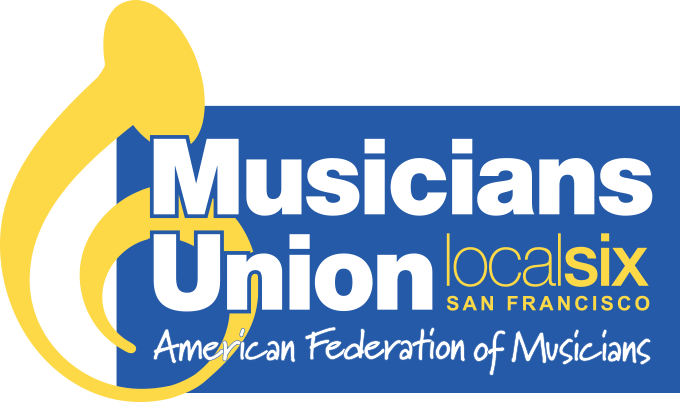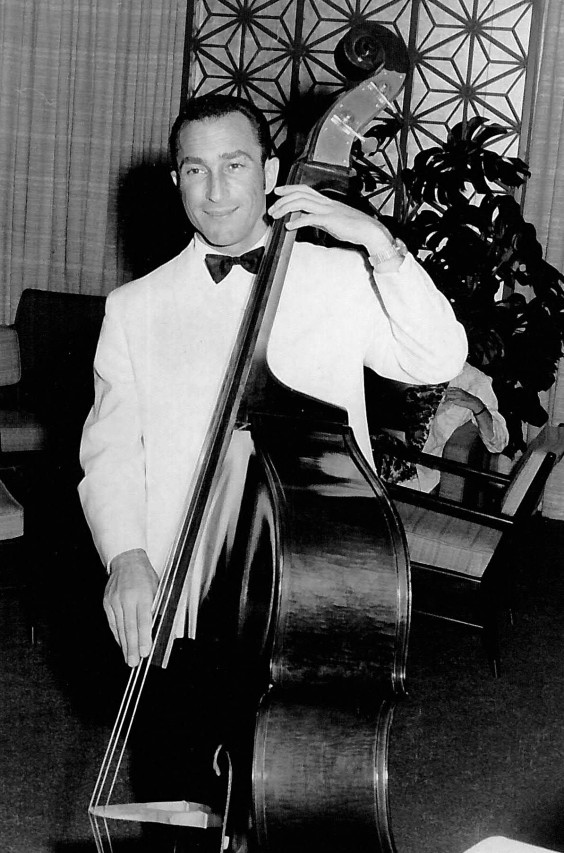Earl Cava: Bass & Vocals – “Whoever Called First, That’s Who I Took.”
by Alex Walsh
Earl Cava is a vocalist and bassist. He joined the Union in 1967 and has played over 1000 weddings in the Bay Area. As a Life Member he continues to play and currently leads his own group.
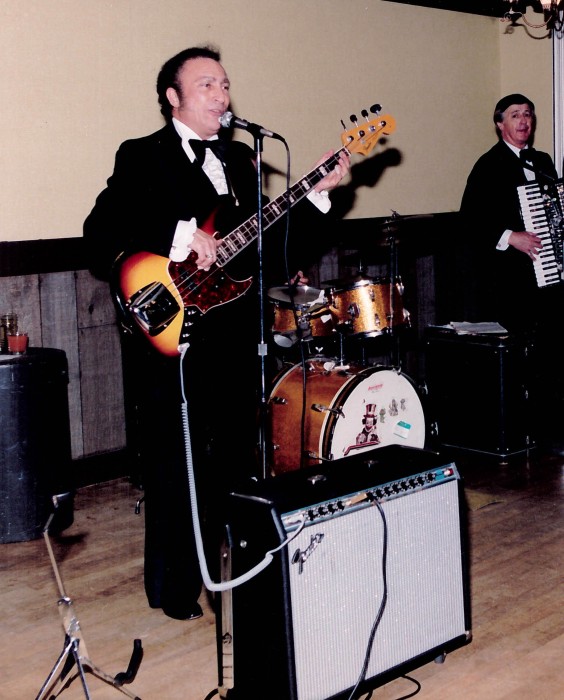
Earl joined Local 6 in 1967. Five years later he joined Local 510 which merged with Local 153. “It was my hobby. The guys at work used to say, ‘You make pretty good money for a hobby.’”
Earl was born in Oakland in 1932. He had a twin brother, an older sister and a younger brother. Both his parents were singers. His father, who sang in a quartet, died when they were young. His mother just loved to sing: “My mom had the voice–light opera. When she felt like singing you could hear her all the way down the block. I think that’s where I got it.”
Earl’s first big singing gig happened when he was eight years old. Coming from a large Italian family, when they got together everybody had to perform something, so Earl said he would sing. “They said if you sing you’ll get a quarter. I started there.”
A few years later he taught himself the ukulele, which was popular at the time. He then switched to guitar. Earl attended high school at Oakland Technical High where his two great loves were music and baseball. After school he played with the Meyer’s Acorns in Alameda which was associated with the Oakland Oaks. When he graduated in 1950, Earl thought he had a shot at making baseball a career. In early 1951, the coach told him that he got him a tryout with the San Francisco Seals.
“He told me where to go. I was in the first round. I was on 2nd base. A guy hit one a mile high. This was in San Francisco at the old Seals Stadium, where you know how windy it is. I got lucky and I caught the thing. They made a big write up in the Chronicle about it. I only weighed 110 pounds at the time. My coach said ‘Don’t put that down, they’ll never take you. Put down 140 pounds and wear a big sweat shirt. So I said ‘Ok, you’re the boss.’ In the write up it said I was 140 pounds.
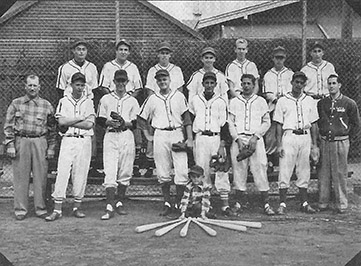
The Meyer’s Acorns posed for a photograph in 1950 at Lincoln Park in Alameda. Earl Cava is in the back row at the far right, and coach Ed Tickalot is in the front row, far right.
I made it to the last cut and then the manager called me over and said, ‘You don’t weigh 140 pounds. If we send you to Arizona you’re going to lose 20 pounds and we can’t afford that. I’ll tell you what, we like what you’ve done so far, come back next year and we’ll talk contract.’ I was all excited. I was disappointed but he was right. But then that’s when the service came along.’
The military draft was in full effect at this time (it ended in 1973) and young men could go to the draft board and get an estimate of when their number would be called.
“My brother and our friend Hank and I went to the draft board in Oakland and they said we’d be called in six months. I said, ‘I don’t want to go in the Army, that’s for damn sure.’ We said, ‘Well, why don’t we join the Air Force? We can do it a week from now and we’ll have a big party.’ A friend heard our plan and said he knew of a better deal with the Navy. It was two years of active duty and six years of inactive. We would be stationed at the Oakland Airport as Stations Keepers. We said, ‘No, we want to get away from Oakland and see the world.’ In the end we went ahead and joined the Navy because of the [Korean] War. It’s a good thing we did because it was escalating. I was in from ‘51-‘53. By the time I got out I had lost interest in baseball. So I went back to my music and that was it.”
During his time on the base, Earl earned a physicians assistant degree. Just before his release he started taking singing lessons with Dick Vance in Oakland. “I used to have a room by myself, so on non-duty nights I’d go and practice there.” He also bought a bass and started taking lessons.
When the war ended Earl worked on the waterfront for the PMA, which is part of the ILWU Union. “We were called Longshoremen but I worked in the office. The heaviest thing we lifted was a pencil.” It took him six years to get his ILWU book, which meant he was on the A list and could count on steady work. “Once I got my A book I had it made.”
Earl sang with a vocal group called the Gondaliers. They performed songs from the 1920s and wrote their own songs.
In 1955 he got married. He knew going on the road with the Gondoliers would be hard but he was ready to do it. “We had a few things going in Hollywood. We signed with American Records, which was part of Capitol, and a publishing company picked up five of our tunes. We should have seen a lawyer before we signed because we thought they were taking advantage of us. We wrote a song called Santa Rock which had a few people interested, but they didn’t like the lyrics so it fell through. We eventually released our album but it didn’t sell so they dropped us and we ended up in litigation. We were very dissapointed.”
A year later his daughter was born, and two years later he was divorced. By 1960, the Gondoliers had broken up and Earl wasn’t doing much music. “I just stopped playing. I did make a recording once in a while out in the garage. But professionally, not until I joined Local 6.”
In 1964 Earl started looking around for a bass teacher and in 1967, with encouragement from his cousins, he joined the union. As a side musician he had a very simple philosophy: “Whoever called first, that’s who I took. I figured that was the fairest way. I didn’t want to make any promises to any groups. I also didn’t want to say, ‘Oh, I’ll let you know.’ I was just being honest with them. I knew a couple guys who would say, ‘Oh, I want to see if I can get a better job.’ I just didn’t want to play that game. At the time I played the upright. I was with at least five groups. Some of the guys I didn’t know. They just heard my name I guess.”
Earl started with the Lou Pidora Orchestra, Earl Blasingame, the Lou Earl Orchestra and Billy Selack. They played dances, cocktail lounges, and every country club from Richmond to Palo Alto including the Willow Park Country Club in Castro Valley, the Sinole Country Club and the Richmond Country Club. “We worked in the members room at the Castlewood Country Club for five years, every Saturday night. Sometimes we’d work there during the day, go get dinner, and then come back to work from 9-1. That was a good job. Quiet but good.”
They played the hotels in San Francisco including the Hilton and the Fairmont. “Most of the time these were weddings. Billy Selack, he got most of these jobs. For several years we’d average 40 jobs a year. A lot of times we’d play Friday night, Saturday day, Saturday night, and Sunday night. We did that for several years. We were always in tuxedos, always classy. This lasted through the 70s, 80s, and 90s. I must have done 1000 weddings. The change came when they brought in DJs. A few places would do both. A band and a DJ, but it didn’t happen that often. It was mostly DJs.”
In the early 90s, Earl was inspired to start his own group. “We were out at the VA in Livermore. We got a lot of work there with the MPTF. I was the leader and they kept requesting us so I got the idea of just sticking with it. I enjoy being a leader.”
One of Earl’s fondest memories is the time he spent playing in the band on a cruise ship. Bill Mugatholer, a booking agent, saw him working in a club in 1969 and approached him to join the SS Monterey for a six week cruise to Australia. “I had a great time. I was with Al Lang. He was the piano player, it was his job. We were a four piece: sax, bass, piano, and drums. They wanted me to go for one more trip but I said I couldn’t, I had to protect my day job. I couldn’t take another three months off. ”
“One time we were in the Tasmanian Sea between Australia and New Zealand. I was downstairs playing in the cocktail lounge and I started getting cold sweats. I got sick. I wouldn’t wish it on my worst enemy. I stuck the bass under the piano and went to my room to lie down. Al came in and I said I was sorry. He said, ‘Oh, don’t worry about it. You lasted longer than anyone else. Some guys only get out to the Golden Gate before they get sick.’ I slept for a few hours. By that time the band was playing upstairs and I guess they made the announcement that I was under the weather. When I woke up I felt great. I got dressed, got something to eat and went upstairs. As soon as I walked in everybody started clapping.”
In the mid-seventies Earl was asked to sing for Barry Manilow’s mother at The Blue Dolphin in San Leandro. “Barry Manilow’s mother was in a wedding party. Bill Paluso was in charge of the Blue Dolphin and asked if I would do him a favor and come in to sing one of Manilow’s songs, I Write The Songs, which was a big hit at the time. I said, ‘Sure, I’d love to do it.’ So I sang it and she loved it.”
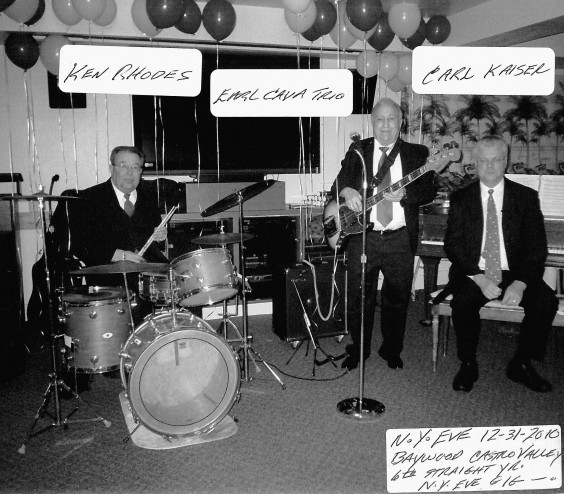
Over the years, people have described Earl’s voice as a combination of Perry Como and Tony Bennett. “I didn’t try to mimic them. I wanted to sound like myself. But that’s the reaction I got from some people.”
For the past eleven years Earl has had a Memorial Day Weekend and New Years Eve gig with his trio at the Baywood Country Club in Castro Valley. “I sing and play bass. I like being the bandleader because I get to sing what I want. When someone asks us to do a song we don’t know I say, ‘There are only five songs we don’t know–and that’s one of them.’ People laugh and don’t seem to mind.”
One of Earl’s more interesting gigs was the time he played a nudist colony (recently printed in the San Leandro Times and the International Musician):
“Of all the different types of gigs I’ve worked, the nudist colony was a night to remember. I got a call from my pal Buzzy, who had a trio, asking me if I had ever worked a nudist colony gig. I said, ‘No, but it sounds interesting. Count me in.’ I asked Buzzy if there was a dress code. He told me just to wear my birthday suit. So, not knowing for sure if he was kidding, I brought both my bass guitar, and an upright bass. (I could play the upright and hide behind it, if necessary.) Buzzy gave me the directions to the Sequoia Nudist Colony in Castro Valley, which I didn’t know existed. As I approached the main gate I was greeted by three women in their birthday suits. They gave me directions to the club and told me the dance started at 8:00pm. People always ask if we played in our birthday suits. I dodge the answer, and I still dodge it to this day. I can say, however, that when we took our first break, we talked to all the club members. I can tell you that they were friendly and the nicest bunch of people.”
